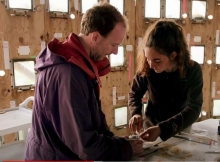The Natural Sciences and Engineering Research Council of Canada (NSERC) ensures Canada’s working landscapes remain biologically diverse, resilient, and adaptive


Two McGill researchers developing solutions to clean marine oil spills in the Northwest Passage and in oceans surrounding Canada to receive $3.7 million in funding from the Multi-Partner Research Initiative (MPRI).

Rappelling down a 650-foot cliff to catch seabirds on a remote island just below the Arctic Circle was scary enough.
“The first time you look over and you rappel over, it’s certainly not for the faint of heart,” said Kyle Elliott, a research chair in Arctic ecology at McGill University in Canada.
But for Elliott and fellow researcher Emile Brisson Curadeau, it was the hungry polar bears (Ursus maritimus) — usually one a day walking near their cabin — that raised real concerns, and devoured their research subjects.

Congratulations to NRS professor Joann Whalen who has been made a Fellow of the Canadian Society of Soil Science (CSSS). The Award is for members with a distinguished record of accomplishment in soil science & service to the CSSS.
CITATION

Congratulations to NRS professor Joann Whalen, who was recently awarded the Auguste Scott prize given by the Association quebecoise de specialistes en science du sol (AQSSS). Other professors who won it previously were Dr. Gus Mackenzie and Dr. Guy Mehuys. The prize is awarded for outstanding contributions to the field of soil science.

On June 14 in Victoria, British Columbia, the Honourable Kirsty Duncan, Minister of Science and Sport, announced an investment of over $275 million for 346 new and renewed Canada Research Chairs at 52 institutions across Canada. The Canada Foundation for Innovation also made an important investment towards these Chairs in providing more than $5.2 million in new funding for research infrastructure, supporting 30 Chairs at 18 institutions.

Some entomologists are sounding the alarm that native bees could be in danger of being wiped out, because of the popularity of urban beekeeping.
“The danger is that we’re probably losing species and don’t even know it,” says Gail MacInnis, a PhD entomology candidate at McGill University. Something needs to be done, she says, to control the number of honeybees being raised.
D’après Sébastien Faucher, professeur au département des sciences des ressources naturelles à l’Université McGill, les rince-bouche ne sont qu’une goutte d’eau dans la pollution de nos cours d’eau.
Lire dans Le Journal de Montréal
The EcoToxChip is expected to generate huge savings in time, money and live animals in testing thousands of chemicals for toxicity. The project is being led by researchers at the University of Saskatchewan, McGill University in Montreal and Environment and Climate Change Canada in Ottawa.

« Depuis le début des années 2000, plusieurs acériculteurs expriment leur inquiétude relativement aux conséquences des changements climatiques sur leur industrie. « Ils se demandent si ce secteur restera viable tant du point de vue économique que de celui du processus de la coulée de sève, relate Benoît Côté, professeur agrégé et directeur des études graduées au Département des sciences des ressources naturelles de l’Université McGill. Ça m’a incité à me pencher sur cette question au début des années 2010.

Lorsque des agriculteurs demandent à l’agronome Joann Whalen comment réduire leurs émissions de gaz à effet de serre (GES), elle leur répond qu’il leur suffit de modifier certaines de leurs pratiques. « Il faut comprendre que les microorganismes du sol produisent naturellement des GES, explique-t-elle. Comme ces organismes ont besoin de carbone organique et d’azote (nitrates), on peut “jouer” sur la disponibilité de ces éléments pour diminuer leur activité et, par conséquent, sur les émissions de GES. »

NRS students and staff receive "Principal's Prize for Public Engagement" recognition
Kudos to FAES Science Communicators Allyson Menzies (PhD Candidate-NRS-Humphries), Marianne Falardeau-Côté (PhD Candidate-NRS-Bennett) and Emeritus Professor David M. Bird (NRS), who recently received well-deserved recognition from the Principal’s Prize for Public Engagement through Media.

What is the secret to longevity? Kyle Elliott (NRS) and Anne Mouillier (MSE) share clues to the aging process in the black-winged kittiwake in the debut of Aging in the Wild on this week's Nature of Things.

Que nous dit le Grand Nord sur notre climat, présent et passé? Isabelle Burgun s’entretient avec deux chercheurs : Marianne Falardeau-Côté, candidate au doctorat au département des sciences des ressources naturelles à l'Université McGill. Elle avait précédemment voyagé sur l’Amundsen dans le cadre de sa maîtrise.

Kyle Elliott (NRS), Canada Research Chair in Arctic Ecology is in Tianjin, China to participate in the Annual Meeting of the New Champions of the World Economic Forum (WEF). In 2017, Kyle was named by the WEF one of the best scientists in the world under the age of 40. The theme of this year’s meeting is the need for global collaboration in the 4th Industrial Revolution.
